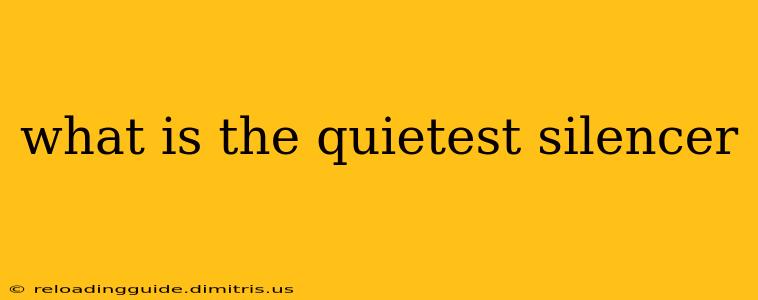What is the Quietest Silencer? A Deep Dive into Sound Suppression Technology
Finding the "quietest" silencer is a complex question, as "quiet" is subjective and depends heavily on several factors. There's no single silencer universally deemed the quietest; the best choice depends on the firearm, caliber, ammunition, and even the environment. However, we can explore the technologies and factors that contribute to a silencer's effectiveness in sound reduction.
Understanding Silencer Technology:
Silencers, also known as suppressors, don't eliminate gunshot sound entirely. Instead, they significantly reduce the noise by using a series of baffles and chambers to slow and cool the expanding gases produced by a firearm's discharge. This process works by:
- Expanding the gas volume: The expanding gases are slowed and diffused, reducing the pressure wave that creates the loud bang.
- Absorbing sound energy: Internal baffles and materials absorb sound energy, further decreasing the overall noise level.
- Cooling the gases: Rapidly cooling the gases reduces their velocity and pressure.
Factors Affecting Silencer Quietness:
Several critical elements influence how quiet a silencer performs:
- Caliber: Larger calibers generally produce louder reports, even with the best suppressors. A .22LR will always be quieter than a .300 Winchester Magnum, even with comparably designed silencers.
- Ammunition: Subsonic ammunition dramatically reduces noise compared to supersonic ammunition. The sonic boom created when a bullet breaks the sound barrier is a significant contributor to overall gunshot noise.
- Firearm Design: The firearm's barrel length and design can affect the effectiveness of the silencer.
- Silencer Design and Construction: The number and arrangement of baffles, internal materials, and overall construction significantly impact performance. More advanced designs and higher-quality materials generally translate to quieter operation.
- Environmental Factors: The surrounding environment (e.g., open field versus enclosed space) will affect how loud the suppressed gunshot sounds.
Types of Silencers and Their Performance:
While specific brands and models constantly evolve, the general principles of silencer design remain consistent. High-quality silencers usually incorporate features like:
- Multiple baffle designs: Different baffle configurations optimize sound reduction at various stages of gas expansion.
- Advanced materials: Materials with excellent sound-absorbing properties are used in the construction.
- Precise machining tolerances: Accurate construction ensures efficient gas flow and optimal noise reduction.
Finding the Right Silencer:
Determining the "quietest" silencer for your needs requires researching reputable manufacturers and considering your specific firearm and ammunition. Consulting with experienced firearms professionals or researching independent reviews from trusted sources is essential. Remember to comply with all local, state, and federal regulations regarding silencer ownership and use.
Disclaimer: This information is for educational purposes only. Always consult with qualified professionals and adhere to all applicable laws and regulations when handling firearms and silencers. Improper use of firearms and silencers can lead to serious injury or death.

